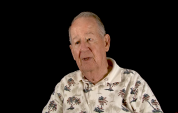6:41 | While he and the rest of his unit were in China, one of the most significant missions they had was to safely escort the US Ambassador from there to Okinawa, Japan after the Chinese Communists breached the city limits. From there he goes on to talk about the naval base in the Philippines, Subic Bay, and the few stories he has from there. One of these was having the honor of meeting Douglas MacArthur.
Keywords : Bob Owen USS Rupertus China ambassador Okinawa Japan missions overseas shore bombardment Chinese Communist Palmer TN Mitchell Flynn Philippines Pacific Fleet Subic Bay Douglas MacArthur Frank Scar Yokosuka Japan Yokohama Japan Johnny Morgan Hill

Despite having a few initial doubts in the first few days, Bob Owen never really regretted joining the Navy. Having spent his early life in seminary school, he ultimately made the decision for himself that he was not a preacher and wanted to instead join the military.
Right after meeting up with a bunch of friends in Nashville to join the Navy, Owen was sent head-shaven into training and boot camp almost immediately. While there he made a few really good friends and, of course, had to endure very tough work environments. The most significant thing he remembers is that they were always kept busy, even if it meant having to perform mundane tasks like repeatedly picking up cigarette butts.
Following training and boot camp, Bob Owen attended radar school so he could learn to detect and communicate with other ships while overseas. Before that, however, he was given two weeks with his family for the holidays and remembers a nasty bus accident that happened on the way home.
After successfully completing his training and studying up in radar school, Bob Owen was finally ready to go aboard the USS Rupertus. On board, he was always kept busy. His main duty was to monitor the destroyer's radar, but was also instructed to join his team in shore bombardment on San Clemente Island. His first assignment was to make a trip to China, where the ship encountered a chaotic typhoon and much of the equipment on the ship was lost as a result.
After his missions in Japan, Owen came back to the states for a brief period as a plane guard for aircraft carriers with the Valley Forge. His ship acted as underwater security for the pilots in the air. If a plane went into the water, it was his team's job to rescue the stranded pilot. As soon as the North Koreans crossed the 38th parallel, the US declared that it was going to help the south. Owen and his team helped aid in the Korean War.
During the Korean War, Bob Owen took on many responsibilities in the Navy. He joined Task Force 95 and helped the South Koreans intimidate the North during negotiation periods between the two. His team continued to help pilots that were shot down, but at one point there was an incident where they accidentally shot down a friendly pilot who had lost the ability to communicate that he wasn't a threat.
Nearing the end of the Korean War, Bob Owen was sent back home for the second time and was accepted into Tennessee Tech college. Following that, he landed a job working radar for the Federal Aviation Administration. After spending many years in the states, he was very flattered when he found out that his grandson wanted to join the military too to follow in his footsteps. To conclude, Owen leaves us with his sentimental final thoughts about his interactions with the Korean people.